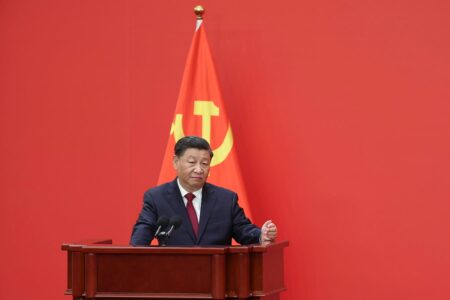No other hedge fund comes close to Ken Griffin’s $74 billion in all-time gains, according to a new LCH Investments report ranking the top 20 all-time managers, but one British fund generated more gains in 2023.
By Hank Tucker, Forbes Staff
Whether the stock market goes up or down, no hedge fund has performed as consistently as billionaire Ken Griffin’s Citadel.
Griffin’s firm generated an estimated $8.1 billion in net profits for investors in 2023, according to LCH Investments’ annual report of the world’s top 20 hedge fund managers, lifting its estimated net gains since inception to an industry-leading $74 billion. Its flagship Wellington fund generated a 15.3% return net of fees in 2023, a source confirmed to Forbes, lagging behind the S&P 500 index’s 24% gain, though that came after a 38% return in 2022 fueled a record $16 billion profit while stocks declined. A spokesperson for Citadel declined to comment for this story.
The Wellington fund’s annualized net return since inception in November 1990 through the end of 2023 is 19.6%, crushing the S&P 500’s 10.7% average annual return during that span, meaning $1 million invested in the fund in 1990 would be worth $378 million today. Citadel returned profits to investors at the end of the year to keep its assets under management at $56 billion.
The next two hedge funds on LCH’s list—D.E. Shaw, which was founded by David Shaw and is now led by a six-person executive committee, and Israel Englander’s Millennium Management—leapfrogged Bridgewater Associates to land in a tie with $56.1 billion in profits since inception. Both generated returns around 10% last year after posting stronger years in 2022 as well, while the HFRI Fund Weighted Composite Index broadly tracking over 1,650 hedge funds was up a dismal 7.6% last year. Hedge funds typically charge their limited partners higher fees than mutual funds or index funds; in exchange they are expected to produce superior returns.
Citadel, Millennium and D.E. Shaw, all founded within two years of each other between 1988 and 1990, have some similarities as multi-strategy firms each with thousands of employees, generating gains from several sources of trading including macro, quant and commodities strategies. Their specific tactics are more opaque than funds that primarily invest in equities, but their methods are working. The $71 billion in gains these three firms alone have generated in the last three years according to LCH represent 38% of the total gains of all hedge funds, though they only account for 4.6% of all hedge fund assets under management.
“Firms of this type typically run with leverage levels far higher than the average hedge fund, which has helped boost their performance. Their strong net returns have been achieved after passing on substantial operating costs, which continues to be tolerated by their investors,” Rick Sopher, chairman of LCH Investments and CEO of Edmond de Rothschild Capital Holdings, said in a press release. “These firms are clearly also able to pay more aggressively to attract the best talent.”
LCH Investments is the world’s oldest fund of hedge funds and has returned 9.9% annually since inception in 1969. It has released this list every year since 2010, recognizing funds that have both sustained strong performance and the scale to generate billions in raw gains since performance often falls off as firms grow.
Bridgewater, the world’s largest hedge fund, is out of the top three for the first time after its flagship Pure Alpha fund lost a reported 7.6% last year, contributing to an estimated $2.6 billion loss. Its assets had already shrunk from a peak of $168 billion in 2019 to $124 billion by the end of 2022 as founder Ray Dalio transitioned out of the business and returns lagged. LCH’s rankings don’t include profits from Bridgewater’s All Weather fund, which generated a 10.6% net return in 2023.
Here is LCH’s full list of the top 20 hedge funds, ranked by net gains since inception.
LCH INVESTMENTS’ TOP 20 HEDGE FUNDS
The largest one-year gain in 2023 came from Christopher Hohn’s TCI Fund Management, which earned an estimated $12.9 billion in profits to leap from 14th to seventh on the all-time list. The $50 billion London-based hedge fund has a concentrated long-focused equity portfolio that includes stakes worth billions in General Electric, Moody’s, S&P Global, Visa and Alphabet, according to SEC filings as of the end of September. TCI returned a reported 32.7% last year, making up for an 18% loss in 2022, as its performance is typically correlated with stocks.
Hohn is a philanthropist who uses some of his profits to finance the Children’s Investment Fund Foundation, which had a $5 billion endowment at the end of 2022 and disbursed grants of $530 million that year, primarily to climate action causes and child health and nutrition.
Pershing Square’s Bill Ackman was another successful stock-picker last year, returning to the top 20 for the first time in nine years. Disastrous investments in Valeant Pharmaceuticals and a short position in Herbalife lost his firm billions from 2015 to 2017, but Ackman has recovered particularly in the last five years with $12.3 billion in gains, according to LCH, lifting his estimated gains since inception to $18.8 billion. Pershing Square gained 26.7% last year thanks to longtime holdings like Chipotle, which rose 65%, and a new position in Alphabet, which it began buying in the first quarter to capture its 58% return. That success came three years after Ackman made billions on credit hedges in March 2020 when markets reacted more dramatically to the early weeks of the pandemic than anybody else expected.
Ackman boasted in a letter to shareholders last June that Pershing Square had generated average annual returns of 28.1% since its March 2018 restructuring, compared with the S&P 500’s 12.1%. He attributed the successful run to investing in the “highest quality durable growth companies,” ensuring his portfolio companies have good leadership and governance, and hedging “‘black swan’ and other global macro risks when the market affords us the opportunity to purchase low-cost ‘insurance’ against these risks.”
MORE FROM FORBES
Read the full article here
















